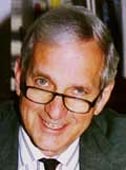"More on Lifelong Learning"

Martin McKneally
|
"I’ve been a surgeon for eight
years. For the past couple of them,
my performance in the operating
room has reached a plateau.
I’d like to think it’s a good thing
- I’ve arrived at my professional
peak. But mainly it seems as if I’ve
just stopped getting better."
Atul Gawande
Terry Axelrod’s conviction that we should all participate
in lifelong learning fits perfectly with his role as
director of Continuing Education for our department.
Few surgeons would accept the notion that we are not
learning as we practice. But surgeon Atul Gawande
writes convincingly about the attenuation of the learning
process: Read his New Yorker article and you will recognize the
logic of Terry’s position. As he explored the problem,
Gawande learned that professional athletes and musicians,
even at the level of violinist Itzhak Perlman and soprano
Renee Fleming have coaches. So he hired a coach and
started learning how to get off the plateau. The story is a
page -turner that ends with a great anecdote.
Surgeons concerned about retirement from active practice
sometimes ask my advice, as a neogeezer, on how to
think about the transition. I usually begin with the story
about our Bigelow lecturer, the television personality
Mehmet Oz, and sexologist Dr. Ruth:
Mehmet: "Dr. Ruth, you’re about to be 86. When are you going to retire?"
Dr. Ruth: "Sonny, the word is rewire!"
Then I roll out my analogy - about how the book of
surgical life comes in 3 volumes. In volume one you prepare
yourself for what you’ll do - school, training, start a
family, locate your practice. It takes about 3 decades. In
volume two, you DO it - applying what you’ve learned
for 3 or 4 decades. Volume three contains the more
reflective and rewarding chapters,
|
where you can think,
write, teach, and explore new challenges while controlling
your own schedule. (That’s why the Spotlight publication
schedule is a little irregular.) In volume three, you
can also start paying back - with precision-targeted philanthropy,
sharing insights learned from past mistakes,
and helping young surgeons. All analogies limp, and the
hitch in this one is what Terry and Atul are saying. Active
learning shouldn’t be confined to volume one; we need
to be learning and teaching throughout our lives. Active
practitioners today are challenged to master new skills at
a rate unimaginable in the past (1).
I am learning a lot about new technology in my volume
three days, as I interview members of our department
who are pushing and breaking boundaries. I’ve also
learned not to say "I’m retired". Self-identified retirees
can be deluged with ideas for how they might fill their
days doing other people’s projects. It is safer, and more
fun to be able to say "I’m working part-time".
Terry Axelrod and Hans Kreder have developed a transition
plan for senior orthopedic surgeons at Sunnybrook.
They share operating room time and practice volume
with new recruits to the division - a 15% reduction in
resource use at age 66 progresses to 30% at 67, then 50%
at 68, 80% at 69, and finally 100% over 5 years. This
sequence can begin earlier than 65, allowing the experienced
surgeon to begin volume three sooner and enjoy
it longer. The plan fits well with the retirement advice of
the great financier and thinker Bernard Baruch: "Don’t
retire your experience; it can achieve so much without
expending much of your energy or time." You can save
your protégés’ time and energy because you have already
invested both earlier in life, and learned from the outcome
of your investment. And you can always rewire.
M.M.
(1) Rosenberg, L. Twenty-first Century Surgery: Have we entered
uncharted waters? Bull Am Col Surg.,2010, Jul: 6-11
|